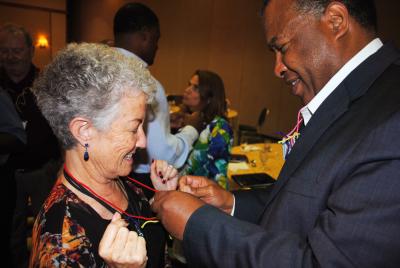NMSU provost serves on executive committee of important national commission

NMSU has also been designated both a Minority Serving Institution and a Hispanic Serving Institution, based on the percentages of enrolled students in those categories.
This makes the work of APLU's Commission on Access, Diversity and Excellence particularly relevant to NMSU, according to NMSU Executive Vice President and Provost Wendy K. Wilkins, who attended the group's summer meeting in Savannah, Ga., July 26-28.
"I also feel that NMSU has much to offer the commission," Wilkins said. "Both NMSU's experience and our values align with CADE's stated purpose.
"Given NMSU President Barbara Couture's inclusion of diversity on her list of NMSU's seven goals for success, it makes sense to work at the national level to discuss emerging trends, share best practices and develop new strategies for making educational opportunities available to under-represented populations."
Wilkins was appointed to CADE's executive committee this year and is the only provost on that body.
She is also a member of the executive committee of APLU's Council on Academic Affairs and intends to capitalize on this dual role to keep issues of access, diversity and excellence front and center in the minds of her fellow provosts.
Within APLU, there are seven issues-oriented commissions to help guide the broader organization's efforts. CADE's key issues, according to its mission statement, include making academic opportunities available to a broader population, diversifying both the student and faculty populations at higher education institutions, and building on diversity to improve the college experience.
The recent summer meeting focused on three specific priorities set by the group's current strategic plan:
• Expanding opportunities for minority and under-represented students in science, technology, engineering and math (STEM) fields
• Diversifying the K-12 teacher work force
• Developing a more diverse and qualified professorate at public four-year universities
The meeting was attended by several dozen representatives of institutions from around the country. Working sessions were interspersed with presentations by higher education experts who updated attendees on a number of issues, including a current Supreme Court case on higher education admissions policies, and comparative doctoral degree completion rates among various groups, including women and under-represented minorities.
"I am especially enthusiastic about this commission because it is so issues-oriented," Wilkins said. "It is about much more than meetings to discuss ideas, however valuable those can be. We develop action items and projects to effect positive changes in higher education."
At NMSU, Wilkins recently oversaw the development of a new academic strategic plan, "Building the Vision." The document includes several strategies and actions for expanding and highlighting the diversity of the students, faculty, staff and leadership of the institution, as well as moving the institution's academic focus in directions that better reflect the diversity of the state's population and the university's unique border setting.


